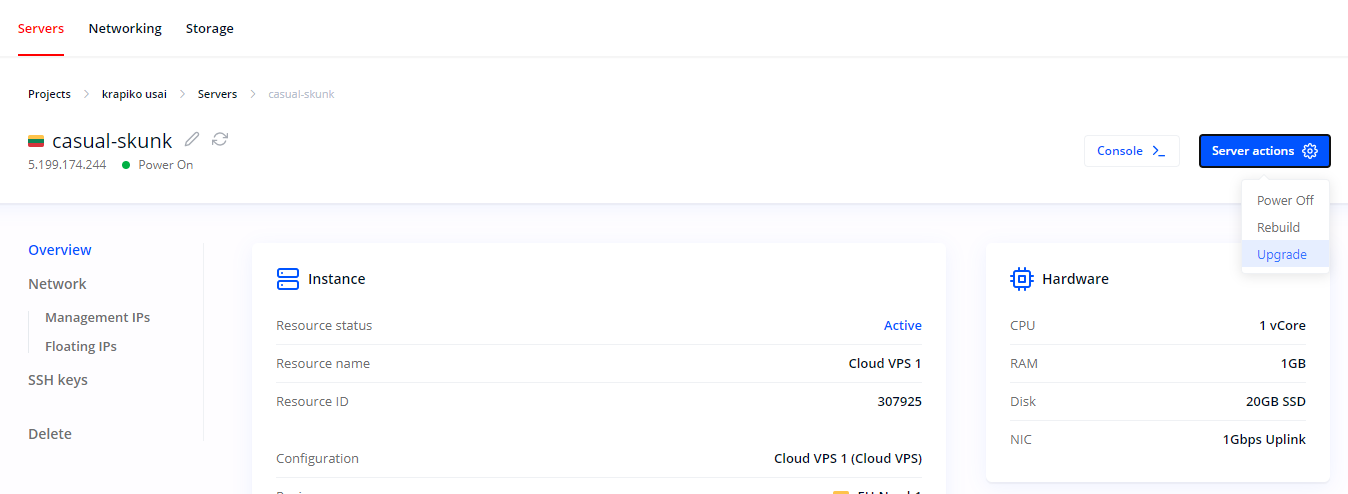Cloud VPS
Cloud VPS servers are kernel-based virtual machines (KVM) that can be easily scaled-up on the go.
What is a Cloud VPS Server?
More specifically, Cloud virtual private server (VPS) is a kernel-based virtual machine (KVM) that shares hardware and network resources with other Cloud VPS servers, just like a standard virtual machine of most of the cloud providers out there.
How can I get Cloud VPS servers?
Cloud VPS Servers are deployed by a fully automated provisioning system that runs a multi-step server preparation process to give you a clean and safe server each time on-demand. You get Linux Cloud VPS servers deployed in 5 to 10 minutes.
Cloud VPS servers are billed on an hourly or fixed-term basis, with monthly, quarterly, semi-annual and annual billing cycles available. You may order Smart VPS servers through your Client Portal or automate provisioning via Cherry Servers API.
How can I scale my Cloud VPS server?
Cloud VPS servers can be scaled-up to a higher tier plan at any time without loosing data stored on that server. There is a short downtime period when moving your Cloud VPS plan into a higher tier. The downtime duration depends on the amount of data stored on your server, and is roughly 1 minute per GB.
Cloud VPS server can be upgraded into a higher tier only. You can do so through your Client Portal by choosing a specific Cloud VPS server, and selecting "Upgrade" option on the Server actions menu, as showed below:

What are available Cloud VPS server plans?
There are 4 Cloud VPS plans available in LT-Siauliai, NL-Amsterdam, US-Chicago, SG-Singapure, SE-Stockholm and DE-Frankfurt regions:
- Cloud VPS 1;
- Cloud VPS 2;
- Cloud VPS 4;
- Cloud VPS 6.
Each Cloud VPS plan has 1TB of free traffic package included by default, according to our Bandwidth Plans, and you pay only €0.5 / TB / month for any extra traffic.
What operating systems are available?
We support the following operating systems for Cloud VPS servers at the moment:
- Ubuntu - versions 22.04 and 24.04;
- Debian - versions 11 and 12;
- AlmaLinux - version 8, 9 and 10;
- RockyLinux - version 8 and 9;
- OpenSUSE - version Leap 15;
- Fedora - 40 and 41;
- CentOS Stream - 9 and 10;
- Alpine Linux 3;
- Arch Linux;
Additional IP Addresses
Instead of a standard Management IP Cloud VPS is assigned with a Floating IP as the primary public IP address of the server. Due to this reason Cloud VPS servers do not have gateway, nor netmask configuration. In addition to the primary IP address you may add a number of additional IP addresses to your Cloud VPS server:
- Floating IP. A public IPv4 address that can be instantly moved from one server to another within the same region.
Features
Backup Storage
Backup Storage is a dedicated network-attached file storage space that is associated with your server. You may activate up to 2TB Backup Storage space for your Cloud VPS server.
Private VLAN Subnet
Private VLAN Subnet is a virtual local area network (VLAN) interface that groups servers within a Team to enable private interactions, as if the servers were attached to the same wire.
Out-of-band Management Console
Out-of-band management (OOBM) Console is a remote server management technology that uses the Remote Frame Buffer protocol (RFB) to remotely control another computer through a Virtual Network Computing (VNC) graphical desktop-sharing system.
Server Tags
Server tagging is a way to mark your cloud infrastructure resources in any organizational pattern of your choice, which helps you organize, control and monitor your cloud resources better.
Cloud-init Service
Cloud-init is a service that allows you fetch user data when provisioning new servers via API.
Present Limitations
Cloud VPS servers share a pool of SSD storage, which is limited to 3000 IOPS.
